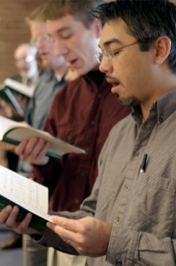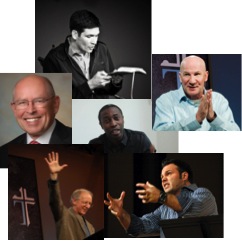WELCOME to the Early
Church.
The purpose of our site is to introduce you to the
dynamic, living faith of the early Christians. This is a clarion call to all
Christians to return to that pure, vibrant, simple Gospel message that
primitive Christianity received directly from the Apostles. The ancient church
lived by it, and shared it with all who would listen. And thus, they
"turned the world upside down" (Acts 17:6). Please browse our site
and see for yourself why the early Christian faith is so relevant for us today.
What Was Early Christianity Like?
The
three distinguishing marks of the early church were: separation from the world,
unconditional love, and childlike obedience to the teachings of Jesus Christ.
Separation from the World
"No one can serve two masters," declared
Jesus to his disciples (Matt. 6:24). However, Christians have spent the greater
portion of the past two millenniums apparently trying to prove Jesus wrong. We
have told ourselves that we can indeed have both-the things of God and the
things of this world. Many of us live our lives no differently than do
conservative non-Christians, except for the fact that we attend church
regularly each week. We watch the same entertainment. We share the same
concerns about the problems of this world. And we are frequently just as
involved in the world's commercial and materialistic pursuits. Often, our being
"not of this world" exists in theory more than in practice.
But the church was not originally like that. The
first Christians lived under a completely different set of principles and
values than the rest of mankind. They rejected the world's entertainment,
honors, and riches. They were already citizens of another kingdom, and they
listened to the voice of a different Master. This was as true of the second
century church as it was of the first.
The Letter to Diognetus, the work of an unknown
author, written in about 130, describes Christians to the Romans as follows:
"They dwell in their own countries simply as sojourners.... They are in
the flesh, but they do not live after the flesh. They pass their days on earth,
but they are citizens of heaven. They obey the prescribed laws, and at the same
time, they surpass the laws by their lives. They love all men but are
persecuted by all. They are unknown and condemned. They are put to death, but
[will be] restored to life. They are poor, yet they make many rich. They
possess few things; yet, they abound in all. They are dishonored, but in their
very dishonor are glorified.... And those who hate them are unable to give any
reason for their hatred." The Letter to Diognetus can be found in the Ante-Nicene Fathers.
Because the earth wasn't their home, the early Christians could say
without reservation, like Paul, "to live is Christ, and to die is
gain" (Phil. 1:21). Justin Martyr explained to the Romans, "Since our
thoughts are not fixed on the present, we are not concerned when men put us to
death. Death is a debt we must all pay anyway."
A second-century elder exhorted his congregation, "Brothers, let us
willingly leave our sojourn in this present world so we can do the will of Him
who called us. And let us not fear to depart out of this world,... deeming the
things of this world as not belonging to us, and not fixing our desires upon
them.... The Lord declares, 'No servant can serve two masters.' If we desire,
then, to serve both God and Money, it will be unprofitable for us. 'For what
will it profit if a man gains the whole world, and loses his own soul?' This
world and the next are two enemies.... We cannot therefore be the friends of
both."
Cyprian, the respected overseer of the church in Carthage, stressed a
similar theme in a letter he wrote to a Christian friend: "The one
peaceful and trustworthy tranquility, the one security that is solid, firm, and
never changing, is this: for a man to withdraw from the distractions of this
world, anchor himself to the firm ground of salvation, and lift his eyes from earth
to heaven.... He who is actually greater than the world can crave nothing, can
desire nothing, from this world. How stable, how unshakable is that safeguard,
how heavenly is the protection in its never-ending blessings-to be free from
the snares of this entangling world, to be purged from the dregs of earth, and
fitted for the light of eternal immortality."
The same themes run throughout all the writings of the early Christians,
from Europe to North Africa: we can't have both Christ and the world.
Lest we think that the early Christians were describing a lifestyle they
didn't really practice, we have the testimony of the Romans themselves. One
pagan antagonist of the Christians remarked:
They despise the temples as houses of the dead. They reject the gods. They
laugh at sacred things. Wretched, they pity our priests. Half-naked themselves,
they despise honors and purple robes. What incredible audacity and foolishness!
They are not afraid of present torments, but they fear those that are uncertain
and future. While they do not fear to die for the present, they fear to die
after death....
At least learn from your present situation, you wretched people, what
actually awaits you after death. See, many of you-in fact, by your own
admission, the majority of you-are in want, are cold, are hungry, and are
laboring in hard work. Yet, your god allows it. He is either unwilling or
unable to assist his people. So he is either weak or unjust.... Take notice!
For you there are threats, punishments, tortures, and crosses.... Where is the
god who is supposed to help you when you come back from the dead? He cannot
even help you in this life! Do not the Romans, without any help from your god,
govern, rule over, and have the enjoyment of the whole world, including
dominion over you yourselves?
In the meantime, living in suspense and anxiety, you abstain from
respectable pleasures. You do not attend sporting events. You have no interest
in public amusements. You reject the public banquets, and abhor the sacred
games.... Thus, wretched as you are, you will neither rise from the dead, nor
enjoy life in the meanwhile. So, if you have any wisdom or sense, stop prying
into the heavens and the destinies and secrets of the world.... Persons who are
unable to understand civil matters are certainly unable to discuss divine ones.
When I first read the criticisms that the Romans leveled against the
Christians, I painfully realized that no one would accuse Christians today of
those same charges. We aren't criticized for being totally absorbed in the
interests of a heavenly kingdom, ignoring the things the world has to offer. In
fact, Christians today are accused of just the opposite. We are accused of
being money hungry and hypocritical in our devotion to God.
A Love Without Condition
At no other time in the history of Christianity did
love so characterize the entire church as it did in the first three centuries.
And Roman society took note. Tertullian reported that the Romans would exclaim,
“See how they love one another!”
Justin Martyr sketched Christian love this way: “We
who used to value the acquisition of wealth and possessions more than anything
else now bring what we have into a common fund and share it with anyone who
needs it. We used to hate and destroy one another and refused to associate with
people of another race or country. Now, because of Christ, we live together
with such people and pray for our enemies.”
Clement, describing the person who has come to know
God, wrote, “He impoverishes himself out of love, so that he is certain he may
never overlook a brother in need, especially if he knows he can bear poverty
better than his brother. He likewise considers the pain of another as his own
pain. And if he suffers any hardship because of having given out of his own
poverty, he does not complain.”
When a devastating plague swept across the ancient
world in the third century, Christians were the only ones who cared for the
sick, which they did at the risk of contracting the plague themselves.
Meanwhile, pagans were throwing infected members of their own families into the
streets even before they died, in order to protect themselves from the disease.
Another example illustrates both the brotherly love
of Christians and their uncompromising commitment to Jesus as Lord. A pagan
actor became a Christian, but he realized he had to change his employment
because most plays encouraged immorality and were steeped in pagan idolatry.
Furthermore, the theater sometimes purposefully turned boys into homosexuals so
they could better play the roles of women on stage. Since this newly-converted
actor had no other job skills, he considered establishing an acting school to
teach drama to non-Christian students. However, he first submitted his idea to
the leaders of his church for their counsel.
The leaders told him that if acting was an immoral
profession then it would be wrong to train others in it. Nevertheless, since
this was a rather novel question, they wrote to Cyprian in nearby Carthage for
his thoughts. Cyprian agreed that a profession unfit for a Christian to
practice was also unfit for him to teach, even if this was his sole means of
support.
How many of us would be so concerned about
righteousness that we would submit our employment decisions to our body of
elders or board of deacons? How many church leaders today would be so concerned
about offending God that they would take such an uncompromising position?
But that isn't the end of the story. Cyprian also
told this neighboring church that they should be willing to support the actor
if he had no other means of earning a living—just as they supported orphans,
widows, and other needy persons. Going further, he wrote, “If your church is
financially unable to support him, he may move over to us and here receive
whatever he needs for food and clothing.” Cyprian and his church didn't even
know this actor, yet they were willing to support him because he was a fellow
believer. As one Christian told the Romans, “We love one another with a mutual
love because we do not know how to hate.” If Christians today made such a
statement to the world, would the world believe it?
The love of the early Christians wasn't limited
simply to their fellow believers. Christians also lovingly helped
non-believers: the poor, the orphans, the elderly, the sick, the shipwrecked—even
their persecutors. Jesus had said, “Love your enemies ... and pray for those
who spitefully use you and persecute you” (Matt. 5:44). The early Christians
accepted this statement as a command from their Lord, rather than as an ideal
that couldn't be actually practiced in real life.
Lactantius wrote, “If we all derive our origin from
one man, whom God created, we are plainly all of one family. Therefore it must
be considered an abomination to hate another human, no matter how guilty he may
be. For this reason, God has decreed that we should hate no one, but that we
should eliminate hatred. So we can comfort our enemies by reminding them of our
mutual relationship. For if we have all been given life from the same God, what
else are we but brothers? ... Because we are all brothers, God teaches us to
never do evil to one another, but only good—giving aid to those who are
oppressed and experiencing hardship, and giving food to the hungry.”
The Scriptures teach that a Christian shouldn't
take his brother to court. Rather, he should suffer fraud at the hands of his
brother, if need be. (1 Cor. 6:7) However, as an attorney, I've seen that
Christians today don't hesitate to sue their brothers and sisters in Christ. A
particularly disturbing case happened recently in the town where I live. A
student at a local Christian school worked on campus in his spare time to help
pay his tuition. One day he was overcome from the fumes of some insecticide he
was spraying in the school building, and he was briefly hospitalized. The
school's method of applying the insecticide was apparently improper. The
result? The parents sued the Christian school for more than half a million
dollars. In contrast, early Christians not only refused to take their fellow
Christians to court, most of them refused to take anyone to court, since
they viewed every human as their brother or sister.
It's no wonder that Christianity spread rapidly
throughout the ancient world, even though there were few organized missionary
or evangelism programs. The love they practiced drew the attention of the
world, just as Jesus said it would.
A Childlike Trust In God
To the
early Christian, trusting God meant more than a teary-eyed testimony about “the
time I came to trust the Lord.” It meant believing that even if obedience to
God entailed great suffering, God was trustworthy to bring a person through it.
“A person who does not do what God has commanded
shows he really does not believe God,” Clement declared. To the early
Christians, to claim to trust God while refusing to obey Him was a
contradiction (1 John 2:4). Their Christianity was more than verbal. As one
early Christian expressed it, “We don't speak great things—we live them!”
One distinguishing mark of the early Christians was
their childlike, literal obedience to the teachings of Jesus and the apostles.
They didn't feel they had to understand the reason for a commandment before
they would obey it. They just trusted that God's way was always the best way.
Clement asked, “Who then is so irreverent as to disbelieve God, and to demand
explanations from God as from men?”
They trusted God because they lived in awe of His
majesty and wisdom. Felix, a Christian lawyer in Rome and a contemporary of
Tertullian, put it this way: “God is greater than all our perceptions—He is
infinite, immense. Only He truly understands His true greatness; our hearts are
too limited to really understand Him. We are making a worthy estimation of Him
when we say that He is beyond estimation.... Anyone who thinks he knows the
magnitude of God, diminishes His greatness.”
The supreme example of their absolute trust in God
was their acceptance of persecution. From the time of the Emperor Trajan
(around A.D. 100) until the Edict of Milan was issued in 313, the practice of
Christianity was illegal within the boundaries of the Roman Empire. Being a
Christian was a crime punishable by death. But the Roman officials didn't
generally hunt out Christians. They ignored them unless someone formally
accused a person of being a Christian. As a result, persecution was
intermittent. Christians in one town would suffer horrible tortures and death
while Christians in a nearby area would be untouched. It was totally unpredictable.
Yet, every Christian lived daily with a death sentence hanging over his head.
The very fact that Christians were willing to
suffer unspeakable horrors and to die rather than disown their God was, next to
their lifestyle, their single most effective evangelistic tool. Few, if any,
Romans would die for their gods. There had to be some substance to Christianity
if it meant so much to those who practiced it. In fact, the Greek word for
“witness” is martyr. Not surprisingly, this is also the Greek word for “martyr.”
In many places where our Bibles use the word “witness,” the early Christians
were reading “martyr.” For example, in our Bibles, Revelation 2:13 refers to
“Antipas, my faithful witness, who was put to death in your city.” The early
Christians were understanding the passage to say, “Antipas, my faithful
martyr.” Although most Christians tried to flee local persecution when
possible, they rejected any mass exodus from the Roman Empire. Like little
children, they believed their Master when He said His Church would be built on
a rock and that the gates of Hades could not overpower it (Matt. 16:18).
They realized that thousands of them might die
monstrous deaths, experience excruciating tortures, and suffer imprisonment.
But they were absolutely convinced that their Father wouldn't let the church be
annihilated. Christians stood before the Romans with naked hands, letting them
know that Christians would not use human means to try to preserve the church.
They trusted God, and God alone, as their protector.
As Origen told the Romans: “When God gives the
Tempter permission to persecute us, we suffer persecution. And when God wishes
us to be free from suffering, even though surrounded by a world that hates us,
we enjoy a wonderful peace. We trust in the protection of the One who said, ‘Be
of good cheer, for I have overcome the world.' And truly He has overcome the
world. Therefore, the world prevails only as long as it is permitted to by Him
who received power from the Father to overcome the world. From His victory we
take courage. Even if He should again wish us to suffer and contend for our
faith, let the enemy come against us. We will say to them, ‘I can do all things
through Christ Jesus our Lord who strengthens me.'”
Origen had lost his father to persecution when he
was a teenager, and he himself eventually died from torture and imprisonment at
the hands of the Romans. Yet, with unshakable confidence he told the Romans,
“Eventually, every form of worship will be destroyed except the religion of
Christ, which alone will stand. In fact, it will one day triumph, for its
teachings take hold of men's minds more and more each day.”




